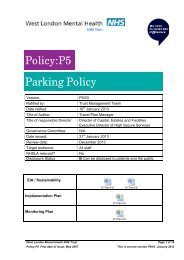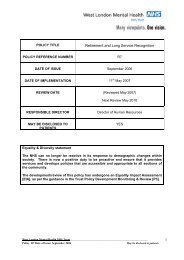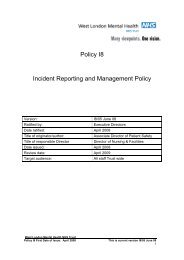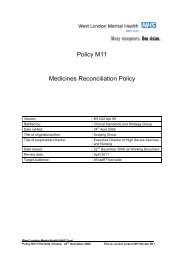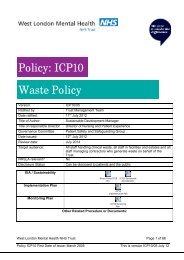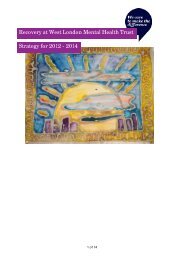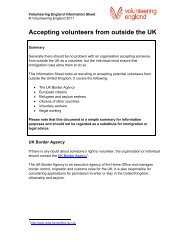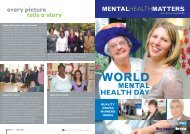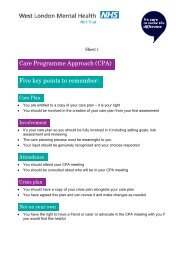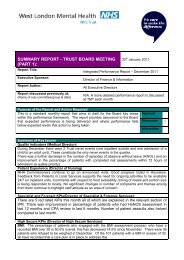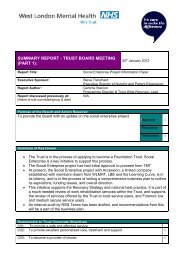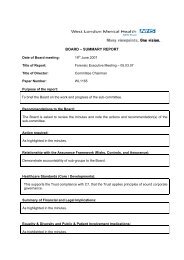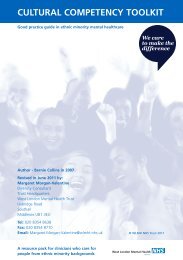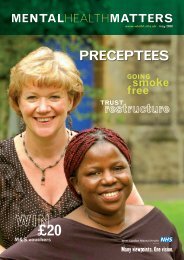MHM March 2010 - West London Mental Health NHS Trust
MHM March 2010 - West London Mental Health NHS Trust
MHM March 2010 - West London Mental Health NHS Trust
Create successful ePaper yourself
Turn your PDF publications into a flip-book with our unique Google optimized e-Paper software.
BOARD TALKRuth Lewis is our new Director of Organisational Development (OD) and WorkforceRuth joined the <strong>Trust</strong> last month, from KingstonHospital where she has been Director of Workforce& OD for two years. Her previous <strong>NHS</strong> rolesinclude Director of Productivity through Peoplefor South <strong>West</strong> <strong>London</strong> SHA and the Director ofHR & OD for Mayday Hospital in Croydon.Following a degree in social administration andsocial policy, Ruth joined British Airways’ graduatetraining programme. Twenty one years in the airlinefollowed, largely in human resources, training andorganisation development roles. While at BA, Ruthgained a masters in organisation development whilstsponsored to study in the United States.Ruth joined the <strong>NHS</strong> from Jewish Care (JC), thelargest health and social care provider to the Jewishcommunity in South East England. The only non-Jewish director, Ruth applied her business acumen toaddressing rising operational deficits in the charity.Numerous services were provided by the charityincluding day centres, residential care and housingfor people suffering from mental health, learningdifficulties or disability.Prior to that, Ruth was the Recruitment Directorat VSO (Voluntary Service Overseas). There shestreamlined processes and initiated a majorculture change programme. The aim of this was toimprove relationships with the charity’s volunteers,enabling cheaper recruitment and better volunteerengagement after their placements in developingcountries.Why have you chosen to come and work here?I’ve been in the <strong>NHS</strong> since 2005, but have notworked directly in a mental health trust, so wasattracted by the prospect of working in a differentarea of the health service. JC sparked my interest inmental health and my mother had dementia untilher death earlier this year. Also, I live within strikingdistance of my new base, only 8.5 miles away! I wasaware of the <strong>Trust</strong>’s CQC report and felt that the rolewould present a worthwhile challenge as well as agreat opportunity to make a difference.This is the first time we’ve had an OD lead on theBoard. What exactly is OD?Organisational development is a holistic andsystematic approach to driving improvement inthe outputs an organisation wants. Based on thebehavioural sciences, it starts with research involvingpeople within the organisation. The researchresults in a diagnostic that is fed back to the earlierparticipants. This then leads to generating ideas forimprovement, prioritisation and documented actionplans. Very often these processes are facilitated byOD consultants - either internal or external. Thediagnostic looks at every aspect of ‘how we do thingsaround here’ – strategies, communication, policies,processes, procedures, systems, attitudes, values andbehaviours. There are always areas for improvement,but building on strengths is just as important asaddressing deficits.”Organisational developmentis a holistic and systematic approachto driving improvement in theoutputs an organisation wants.Based on the behavioural sciences,it starts with research involving”people within the organisation.What are your priorities?I’ve been getting out to meet colleagues and thereare many more to meet and listen to as part of myinduction and data gathering exercise. I’m alreadyhearing what we need to build on and where helpmight be needed to improve things. I’ve alreadybeen directed to the hot spots such as recruitment,PDRs (appraisals) and mandatory training, whichare fundamental to delivering high quality care andsatisfying our regulators - not to mention keepingour insurance premiums down so that we can spendmore on front line provision.I’ll be working with Peter Cubbon and the seniorteam to ensure we have clarity amongst theleadership about where we are going and the keyworkstreams needed to get there. We need tocommunicate our aspirations and discuss themwith colleagues so that everyone in the <strong>Trust</strong> feelsenthusiastic about their part and understands howeverything fits together. Another priority will beensuring alignment in workstreams so that wemaximise the outputs from our limited resources,especially as there will be increasing pressure on thepublic purse.To ensure that we all contribute effectively tothe <strong>Trust</strong>’s objectives we need to strengthenthe individual performance management anddevelopment processes. My team has already beenreviewing the PDR process to simplify it. Havingquality dialogue during the PDR process, to jointlyidentify how to do things better and determinewhat development would support improvement orprogression, is key to retaining talented people andincreasing overall capability and capacity.So, I’ll be looking closely at all our processes to seewhat might be done to improve things. Revisionsto policies or processes will be made with linemanagement and staffside involvement, as this willbe a collaborative effort to shape all our futures andto better support our patients. I invite any memberof staff to give me their thoughts on what helps andhinders us in our endeavour to give personalisedhigh quality care.Describe yourself in four words?Energetic, supportive, challenging, straight-talking.What are your hopes for the <strong>Trust</strong>?I hope that the overwhelming majority of WLMHTstaff, patients and carers will speak positively aboutthe <strong>Trust</strong> so that we readily attract talented colleaguesand increase our share of the commissioners’business – thus creating a virtuous circle. Throughappropriate development activities that help usto deliver our objectives, I hope we retain goodpeople and increase the overall capability of theorganisation. Part of building a supportive culturethat encourages development involves working toensure that poor performance is identified early”This approach makes for ahigh performing organisation whichevery one of us would be proud torecommend to our loved ones, family,friends and neighbours – either forfuture employment or care.”and addressed – relevant support will be providedto ensure we all continuously improve. However,none of us should have to carry poor performers andfinding alternative roles that better fit the skills ofthe individual, or helping them to move outside theorganisation will be necessary. This approach makesfor a high performing organisation which every oneof us would be proud to recommend to our lovedones, family, friends and neighbours – either forfuture employment or care.What three things would you put in your Room 101?• Tripe – boiled it for nearly 24 hours and it stillwasn’t edible• Hot pants – don’t suit most women, me included• The video-recorder – still don’t know how toprogramme it and never have time to watch TV letalone recorded items!What do you like doing when you’re not at work?Aerobics, walking, spending time with my husbandSteve, our families and friends.What’s the best piece of advice you have been given?Don’t stick in your comfort zone – you can do morethan you realise.4 MENTALHEALTHMATTERS MENTALHEALTHMATTERS 5



